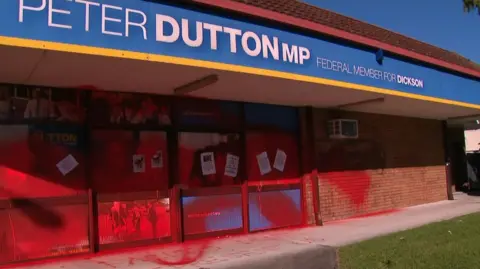A recent incident in Australia has led to a teenager being charged with vandalism following an attack on the office of the opposition leader, Peter Dutton, in Arana Hills, Brisbane. The incident was part of a series of protests against Dutton, particularly amidst his controversial comments regarding Aboriginal rights and ceremonial practices during the ongoing election campaign.
The vandalism occurred late at night, with reports indicating that the office was splattered with red paint and covered in posters denouncing Dutton’s viewpoints on various issues. Notably, this was not the first time Dutton’s office had faced such disruptions; it was vandalized on multiple occasions leading up to the election scheduled for May 3. In this latest incident, police arrived to find four individuals acting suspiciously near the office. While the other three fled the scene, an 18-year-old woman was apprehended and charged with willful damage.
The timing of this vandalism is particularly relevant because Dutton, as the leader of the Liberal Party, has stirred controversy in recent days due to remarks he made about Aboriginal “welcome to country” ceremonies. Such rituals are customary acknowledgments of the traditional land owners and have been a point of cultural significance for Aboriginal and Torres Strait Islander peoples. Dutton’s comments dismissing the ceremonies as “overdone” have sparked backlash not only from Aboriginal activists but also from former colleagues within his party, indicating a split in perspectives on Indigenous recognition.
One of the posters placed on Dutton’s office during the vandalism read, “always was, always will be Aboriginal land.” This phrase resonates deeply in the context of Indigenous rights in Australia. It emphasizes the ongoing connection of Aboriginal peoples to the land, a theme that has been increasingly relevant in national discussions around reconciliation and acknowledgment of historical injustices.
In addition to the red paint and the controversial posters, there have been instances of prior vandalism targeting the same office, including the defacement of windows and the application of derogatory terms such as “maggot” and “scum.” Dutton has yet to publicly address the recent vandalism, but members of his party have voiced concerns regarding the rising tide of political violence and vandalism in Australia. James Paterson, a Liberal Party senator, labeled the attacks as part of a disturbing trend affecting political figures across the country, stating that such incidents have become alarmingly frequent.
As Dutton prepares for the elections, the repercussions of his comments on Aboriginal cultural practices may influence public sentiment and voting behavior. Many voters are increasingly attentive to how candidates address Indigenous rights and issues, reflecting broader societal changes and demands for recognition and justice.
In conclusion, the situation surrounding Peter Dutton’s office exemplifies the intense political climate in Australia as the election approaches. The vandalism not only highlights the divisions and tensions within Australian society concerning Indigenous rights but also serves as an indication of the heightened stakes in the upcoming electoral contest. With public sentiment increasingly focused on inclusivity and cultural recognition, the actions taken by youths and activists may serve as catalysts for broader discussions and potential policy changes.



